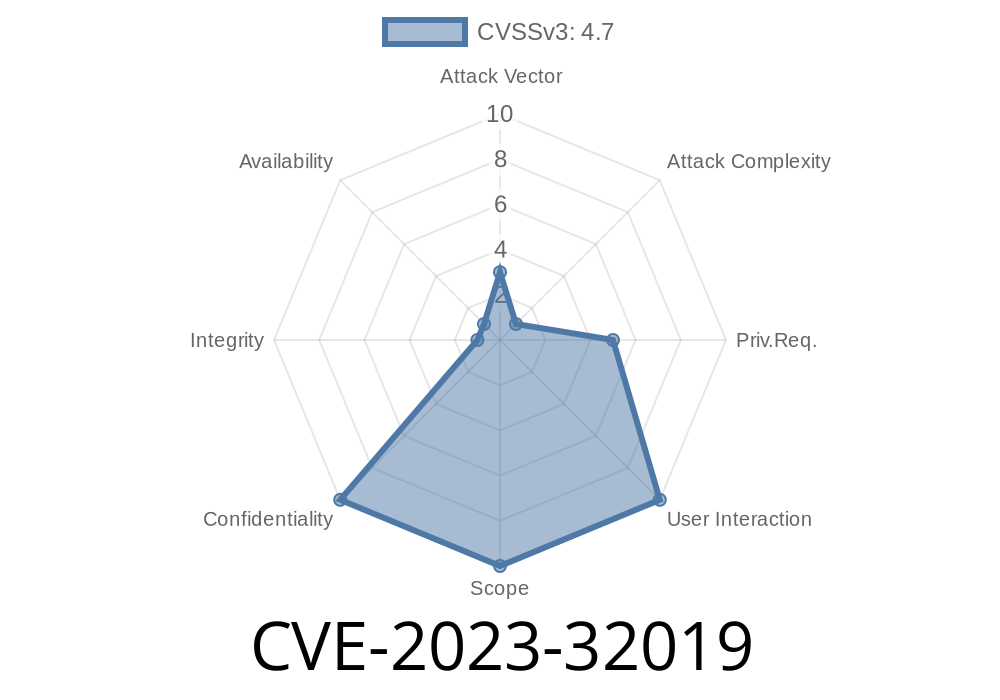---
A Windows kernel bug—CVE-2023-32019—was patched by Microsoft in June 2023. This was an information disclosure vulnerability that potentially exposed sensitive kernel memory to user-mode attackers. Here, we'll break down the bug in plain English, show how it works, give a code snippet for illustration, and link you to official sources. Whether you’re new to security or catching up, you’ll get the full story here.
What Is CVE-2023-32019?
A week before Patch Tuesday, security researcher Mateo Zadnikar reported a kernel problem to Microsoft. If you are wondering what the kernel is: it’s the “core” of Windows. The vulnerability was in a kernel driver and allowed any unprivileged user to access (or “leak”) information from the kernel memory space.
Why does this matter? If an attacker is running code on your Windows PC, they can leverage this bug to read things they shouldn’t see—such as system pointers, kernel ASLR offsets, or maybe info about other processes. That’s a big step toward deeper attacks, like privilege escalation.
Technical Details (In Simple Terms)
The problem existed in how the Windows Win32k component handled certain SYSTEM calls related to window objects. Specifically, a call could cause the system to return *uninitialized* memory back to the user. In programming, “uninitialized” means: “Whatever random bytes were at that place in memory, get sent up.” And that random data might contain clues an attacker can use.
Here’s a simplified C code example showing the type of pattern involved
typedef struct _MYSTRUCT {
DWORD Length;
BYTE Buffer[256]; // This buffer sometimes isn’t initialized
} MYSTRUCT;
NTSTATUS SomeKernelFunction(PMYSTRUCT pUserStruct) {
MYSTRUCT temp;
temp.Length = 256;
// ...bug: temp.Buffer is not initialized or zeroed
// temp.Buffer might contain leftovers from previous kernel operations
// Copy structure to user
memcpy(pUserStruct, &temp, sizeof(temp));
return STATUS_SUCCESS;
}
What’s the bug?
temp.Buffer could leak memory content left by previous kernel tasks.
Receive Leaked Bytes:
Get back data with “slop” (leftover memory) from the kernel—sometimes including pointers, code addresses, or data from other running processes.
Analyze or Chain the Exploit:
Use the leaked information (especially things like kernel memory addresses) to get past Windows defenses, such as KASLR (Kernel Address Space Layout Randomization).
Proof-of-Concept Exploit (PoC)
Here’s a Python snippet using the ctypes library to simulate an info leak through a syscall. (For real exploit dev you’d use C or Assembly, but Python illustrates the logic.)
import ctypes
class MYSTRUCT(ctypes.Structure):
_fields_ = [("Length", ctypes.c_uint32),
("Buffer", ctypes.c_byte * 256)]
# Load the vulnerable driver (in real PoC)
# Simulate the structure coming from the kernel
mystruct = MYSTRUCT()
ctypes.memset(ctypes.byref(mystruct), , ctypes.sizeof(mystruct))
# Simulate: Kernel left Buffer uninitialized
# In reality, the kernel would leak prev memory here
print("Leaked bytes: ", bytes(mystruct.Buffer))
Real exploits would poke the *actual* vulnerable syscall using custom drivers or tools like NtCall64.exe.
The fix is straightforward: Zero the buffer before sending it out. In the code
RtlZeroMemory(&temp.Buffer, sizeof(temp.Buffer));
Now there are no leftovers to leak.
Microsoft Advisory:
Disclosure blog:
https://nvd.nist.gov/vuln/detail/CVE-2023-32019
Deep-dive article:
Kernel Infoleaks: Windows Edition
Proof-of-Concept discussions:
FullDisclosure post on CVE-2023-32019
Patch *now* to stay safe!
*Stay tuned for more security breakdowns in clear, hands-on style!*
Timeline
Published on: 06/14/2023 00:15:00 UTC
Last modified on: 06/14/2023 03:37:00 UTC
